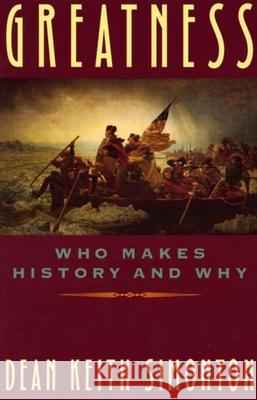Greatness: Who Makes History and Why » książka
Greatness: Who Makes History and Why
ISBN-13: 9780898622010 / Angielski / Miękka / 1994 / 502 str.
Greatness: Who Makes History and Why
ISBN-13: 9780898622010 / Angielski / Miękka / 1994 / 502 str.
(netto: 209,00 VAT: 5%)
Najniższa cena z 30 dni: 217,65
ok. 16-18 dni roboczych.
Darmowa dostawa!
What do Madonna, Confucius, and Jackie Robinson have in common? What does it take to go down in history as a great political leader? Why do revolutions occur, riots break out, and lynch mobs assemble? Which events do people find the most shocking or memorable?
This path-breaking work offers the first comprehensive examination of the important personalities and events that have influenced the course of history. It discusses whether people who go down in history are different from the rest of us; whether specific personality traits predispose certain people to become world leaders, movie stars, scientific geniuses, and athletes, while others are relegated to ordinary lives. In exploring the psychology of greatness, this volume sheds light on the characteristics that any of us may share with history-making people.
Throughout, the book addresses two broad questions: what sorts of people are responsible for historic events and achievements, and what kinds of events are most likely to be seen as history-making at their time of occurrence. Providing a wealth of examples, the text probes the lives of important figures, from charismatic political and military leaders to famous writers, Nobel Prize winners, child prodigies, and Olympic athletes. The book covers history-making events such as international crises, technological innovations and scientific breakthroughs, popular TV shows, natural disasters, and many more.
With unerring insight, Simonton examines the full range of phenomena associated with greatness--everything from genetic inheritance, intuition, aesthetic appreciation, and birth order, to formal education, sexual orientation, aging, IQ, and alcohol and drug abuse. The work embeds psychological topics in the larger contexts of science, art, politics, and history to essentially define a new interdisciplinary field of study: the psychology of history.
Written in an engaging style, and offering the first in-depth examination of a topic with universal appeal, GREATNESS will be welcomed by everyone interested in the people and events that have made the world what it is today.











